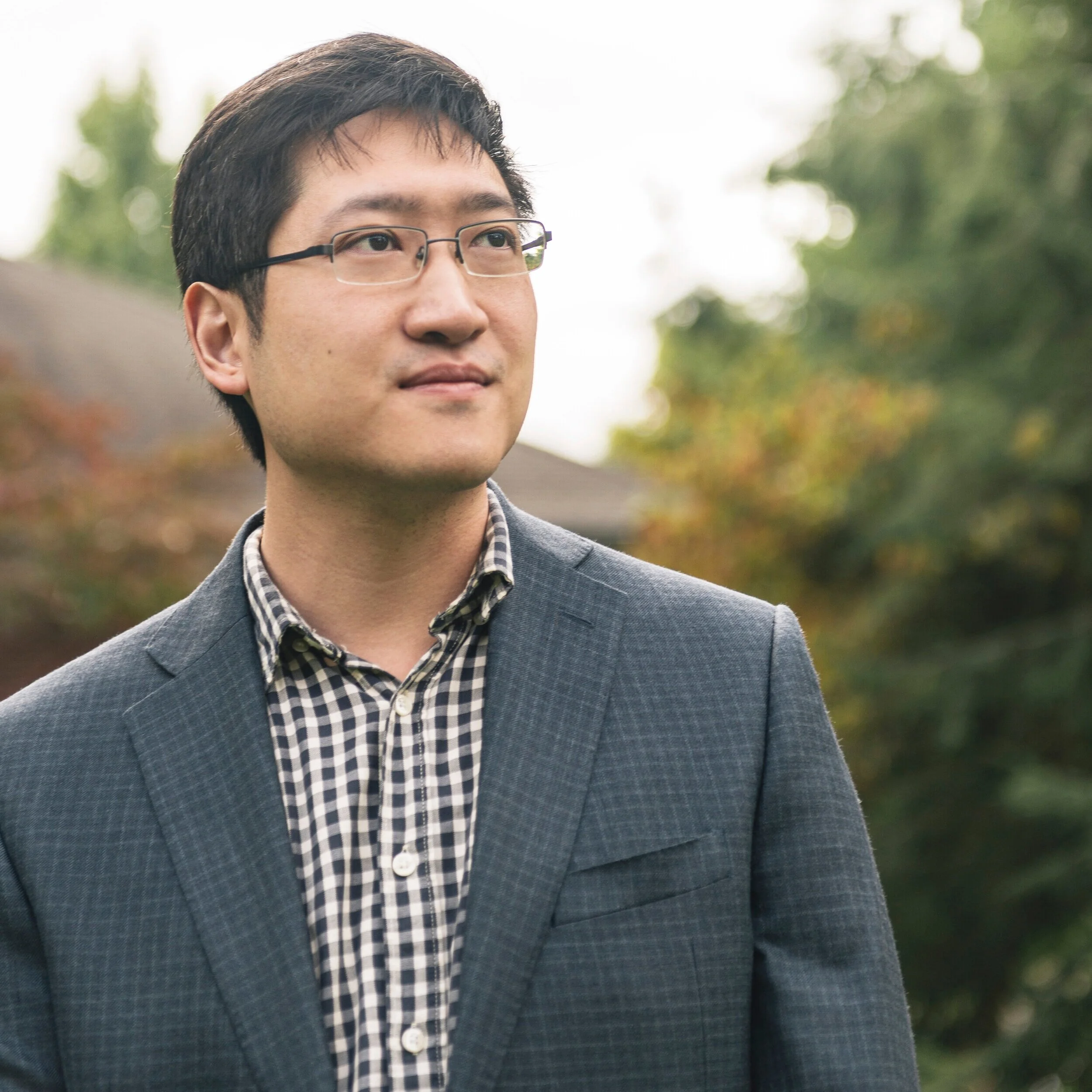"This is a composer who is interested in how a compact idea, a spin of a few notes, will open up harmonic directions going slantwise to any norm. The idea may involve pitches from inside the cracks in the piano keyboard – blue notes and those of many other colours – or regular tones in irregular formations. Music is then made by letting the idea range – a principle that may be drawn as much from a jazz improvisation as from an intricately worked composition by any of the late twentieth-century masters... Cheung’s is music of spectacular sound – of brilliantly imagined solos and gatherings – but it is also music of spectacular time. Harmony being for this composer a condition of movement, we feel ourselves to be travelling through time’s spaces: its zooms and its lulls, its turns and its stallings. The trip is never ordinary."
Paul Griffiths, in his introduction to the Roundabouts portrait disc
Photo Credit: Ben Gebo
About Anthony
Composer and pianist Anthony Cheung writes music that explores the senses, a wide palette of instrumental play and affect, improvisational traditions, reimagined musical artifacts, and multiple layers of textual meaning. Described as “gritty, inventive and wonderfully assured” (San Francisco Chronicle) and praised for its “instrumental sensuality” (Chicago Tribune), his music reveals an interest in the ambiguity of sound sources and constantly shifting transformations of tuning and timbre. As critic Paul Griffiths writes, “Anthony Cheung has an intensely accurate sense of where his notes are going, and how and why…[his music’s] precision is responsible for a wealth of sonic magic.”
Anthony Cheung has been commissioned by leading groups such as the Ensemble Modern, Ensemble Intercontemporain, Cleveland Orchestra (as the Daniel R. Lewis Young Composer Fellow), LA Philharmonic, Frankfurt Radio Symphony Orchestra, Ensemble Musikfabrik, Yarn/Wire, Dal Niente, AMOC*, and the International Contemporary Ensemble. His work “Lyra” was commissioned for the New York Philharmonic at the request of Henri Dutilleux, as part of the orchestra’s inaugural Kravis Prize for New Music. The New York Times wrote of it, “Mr. Cheung’s shimmering score makes a persuasive case for the Orpheus myth as part of a global collective consciousness.” In addition, his music has been performed by the Orchestre Philharmonique de Radio France, Chicago Symphony Orchestra (MusicNOW series), Minnesota Orchestra, Ensemble Linea, Le Nouvel Ensemble Moderne, Scharoun Ensemble Berlin, Court-Circuit, JACK Quartet, wild Up, Atlas Ensemble, Orchestra of the League of Composers, Tokyo Sinfonietta, Taipei Chinese Orchestra, Orchestre National de Lorraine, Orchestre National de Lille, eighth blackbird, the New York Youth Symphony, and the San Francisco Symphony Youth Orchestra. More recently, he has written new works for the Parker, Escher and Spektral Quartets, violinist Jennifer Koh, flutist Claire Chase, oboist Ernest Rombout, and pianists Gilles Vonsattel, David Kaplan, Shai Wosner, and Joel Fan. In addition to concert works, he written music for film (null and void after Guy Maddin and the score to The Burning Child), captioned sound sources (The Natural Word), and in collaboration with multiple poets (the echoing of tenses).
The recipient of a 2016 Guggenheim Fellowship, he has also received awards from the American Academy of Arts and Letters (Charles Ives Fellowship and Scholarship) and ASCAP, and first prize in the Sixth International Dutilleux Competition (2008), as well as a Rome Prize from the American Academy in Rome (2012). He has also received commissions from the Koussevitzky and Fromm foundations.
Cheung’s music has been programmed at international festivals such as Ultraschall (Berlin), Cresc. Biennale (Frankfurt), Présences (Paris), impuls (Graz), Wittener Tage, Ojai, TIME:SPANS (NYC), Wien Modern, Tanglewood, Aspen, Mostly Mozart, Transit (Leuven), Heidelberger Frühling, Helsinki Festival and Musica Nova Helsinki, Centre Acanthes, Musica (Strasbourg), and Nuova Consonanza (Rome).
Photo credit: Camille Tokerud
“Finding this elusive middle path, between compositional rigor and organic musical result, is what I believe makes Anthony’s music so enticing. It somehow swerves the vector of linear music history while at the same time recollecting the remarkable traditions that precede it. It is a mesmerizing glimpse of our future that animates us because it so bewitchingly misremembers our past.”
Doyle Armbrust, in his introduction to the Cycles and Arrows portrait disc
His recordings include several portrait discs: All Roads (New Focus, 2022), Music for Film, Sculpture, and Captions (Kairos, 2022), Cycles and Arrows (New Focus, 2018), Dystemporal (Wergo, 2016), and Roundabouts (Ensemble Modern Medien 2014). His music and performances have also appeared on Warner Classics (performed by Bertrand Chamayou), New Focus, Tzadik, and Mode. His music is published by EAM/Schott (PSNY edition), Editions Alphonse Leduc, and in self-published editions (ASCAP).
As a performer and advocate for new music, he was a co-founder of the Talea Ensemble, performing as a pianist and serving as artistic director. As a pianist, he has worked with leading composers such as Hans Abrahamsen, Pierre Boulez, Chou Wen-Chung, Stefano Gervasoni, Steve Lehman, and Cory Smythe.
Anthony Cheung received a BA in Music and History from Harvard and a doctorate from Columbia University, where he taught and also served as assistant conductor of the Columbia University Orchestra. His primary composition studies were with Tristan Murail and Bernard Rands, and he has studied additionally at the Tanglewood Music Center, Aspen Music Festival, Domaine Forget, Fontainebleau, and Centre Acanthes, working with many leading composers. His primary piano studies were with Robert Levin and Paul Hersh. He was a Junior Fellow at the Harvard Society of Fellows, and taught at the University of Chicago from 2013 to 2020. He is currently an Associate Professor of Music at Brown University, where he teaches courses on topics ranging from theory and composition to the jazz orchestra and Asian musical modernisms.


